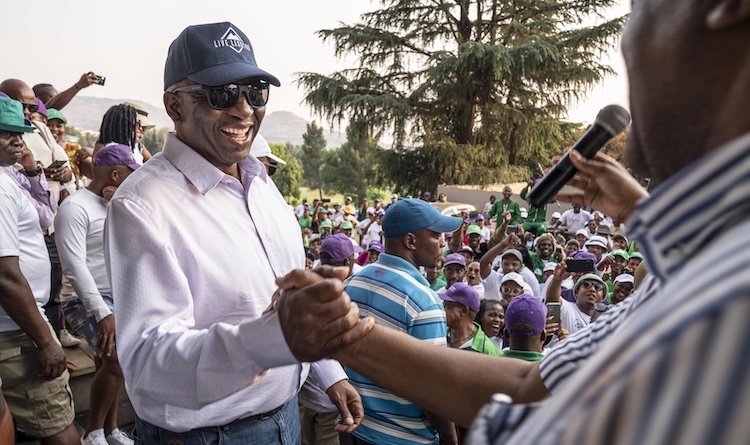By Lisa Vives, Global Information Network
NEW YORK (IDN) — A recently organized party led by a millionaire diamond magnate looks set to win Lesotho’s parliamentary election, having secured enough for a simple majority, according to preliminary results from the election commission.
By Sunday afternoon, results from the October 7 vote were in for 49 out of a total of 80 constituencies. The Revolution for Prosperity (RFP) party, formed by Sam Matekane in March, had secured 41 seats, the minimum required to reach a simple majority.
The current ruling party All Basotho Convention (ABC), which has run the country of 2.14 million people since 2017, was faring badly with no seats won so far, the tally showed.
Wealthy Lesotho businessman Sam Matekane and his brand-new Revolution for Prosperity party is on track to defy predictions that no single party would win a clear majority and that Lesotho would be saddled with yet another unstable coalition.
The Democratic Congress (DC), the main opposition party and member of the coalition government is running a distant second to the RFP in the race, having secured some six seats.
Under the outgoing All Basotho Convention, the southern African country was marred by political upheaval, stalled reforms and widespread exasperation of people over political wrangling, corruption and policy paralysis.
Matekane has promised to usher in a new era of governance and prosperity in the country by exploiting its natural resources and its commercial competitiveness, drawing from its founder’s experience in running businesses.
In the October 7 poll, security, corruption and jobs were the three main issues highlighted by politicians in the seventh ballot since the reinstatement of democracy in 1993. But whether this makes any difference to the mountain kingdom’s economic trajectory is questionable, Dr Greg Miles, head of The Brenthurst Foundation, wrote in the South African Daily Maverick.
“Politics is supposed to be the means to provide a policy and governance platform for growth and development,” he wrote, adding “Not so in Lesotho, as in much of southern Africa. Rather it’s been about the redistribution of wealth to parties indistinguishable by their policies, if not their promises, and defined by their personalities.
“Elections have become a competition between personalities and their promises. Party manifestos are routinely a laundry list of unfunded (and apparently unfundable) projects, with subsequent governments apparently wholly incapable of delivery.
“This explains why there were 65 political parties contesting the October 7 election, and why the civil service wage bill, at 20% of GDP, is unbearably large, or why at a more mundane level, its overinflated 38 ministers are entitled to two cars, a 4X4 and an upmarket German luxury sedan.
Currently, “one third of Lesotho’s 2.1 million citizens live in poverty. A breakdown in governance—the rule of law—alongside low growth and high inequality lends itself to violence. Lesotho’s murder rate is 44 per 100,000, compared to South Africa’s already insufferably high 33/100,000.
“Lesotho has never had to develop its own development path replete with hard choices and ownership of its destiny. There has always been a soft, diplomatically-directed option: donor funding especially during the apartheid years,
“The RFP will likely be at the helm of the new government, led by a man with obvious business successes and interests. A national prosperity agenda will require turning politics from simply being economics by other means to driving a national development plan aimed at growth rather than redistribution. If it doesn’t change the act of politics in Lesotho, the RFP can only become another casualty of its ongoing political drama.” [IDN-InDepthNews – 11 October 2022]
Photo: Lesotho’s RFP leader Sam Matekane shakes hands with a party member after the announcement that his party was on track to win a majority in parliament. Credit: Shiraaz Mohamed.
IDN is the flagship agency of the Non-profit International Press Syndicate.
This article is published under the Creative Commons Attribution 4.0 International licence. You are free to share, remix, tweak and build upon it non-commercially. Please give due credit.

